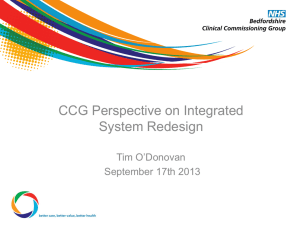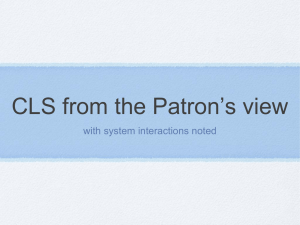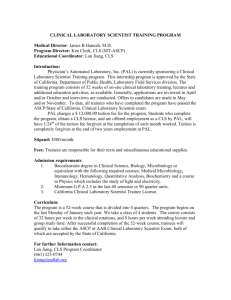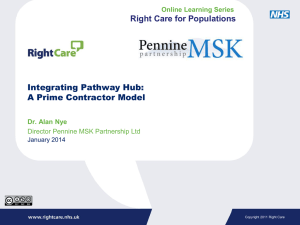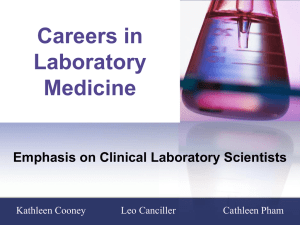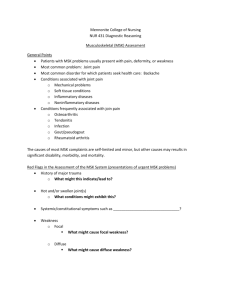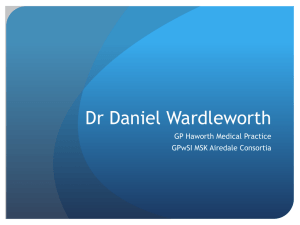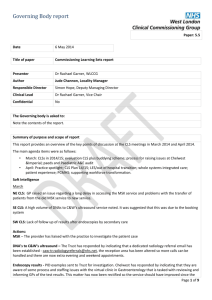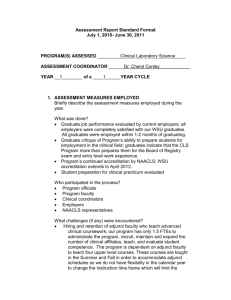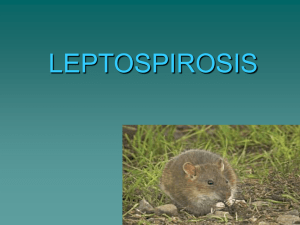- NHS West London Clinical Commissioning Group
advertisement
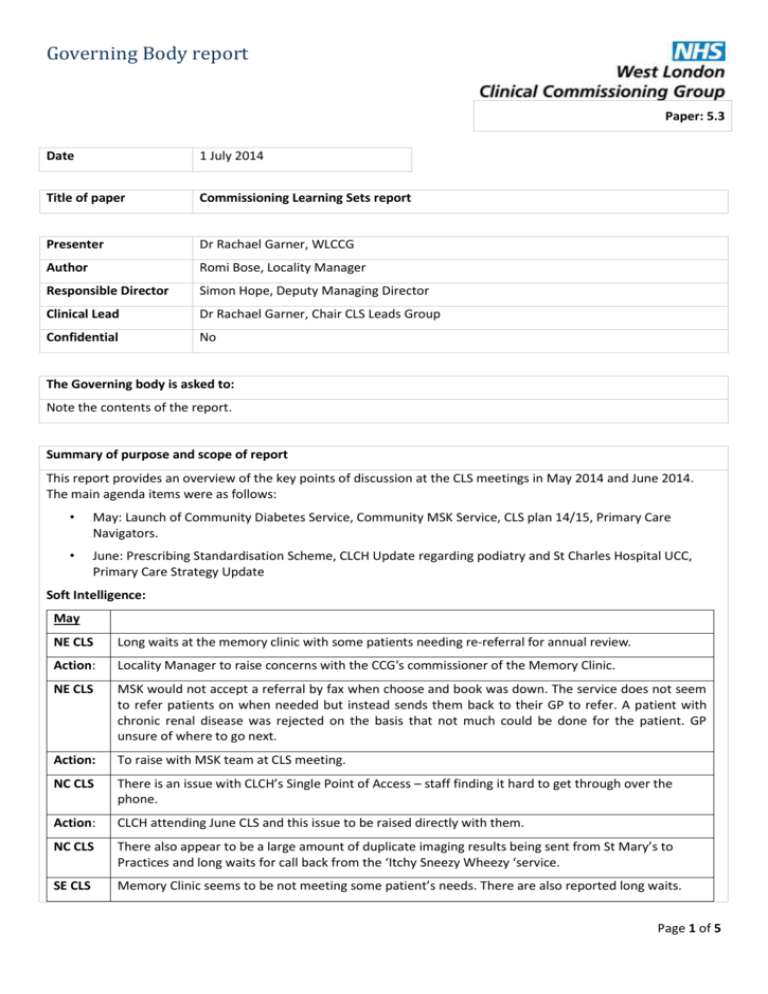
Governing Body report Paper: 5.3 Date 1 July 2014 Title of paper Commissioning Learning Sets report Presenter Dr Rachael Garner, WLCCG Author Romi Bose, Locality Manager Responsible Director Simon Hope, Deputy Managing Director Clinical Lead Dr Rachael Garner, Chair CLS Leads Group Confidential No The Governing body is asked to: Note the contents of the report. Summary of purpose and scope of report This report provides an overview of the key points of discussion at the CLS meetings in May 2014 and June 2014. The main agenda items were as follows: • May: Launch of Community Diabetes Service, Community MSK Service, CLS plan 14/15, Primary Care Navigators. • June: Prescribing Standardisation Scheme, CLCH Update regarding podiatry and St Charles Hospital UCC, Primary Care Strategy Update Soft Intelligence: May NE CLS Long waits at the memory clinic with some patients needing re-referral for annual review. Action: Locality Manager to raise concerns with the CCG's commissioner of the Memory Clinic. NE CLS MSK would not accept a referral by fax when choose and book was down. The service does not seem to refer patients on when needed but instead sends them back to their GP to refer. A patient with chronic renal disease was rejected on the basis that not much could be done for the patient. GP unsure of where to go next. Action: To raise with MSK team at CLS meeting. NC CLS There is an issue with CLCH’s Single Point of Access – staff finding it hard to get through over the phone. Action: CLCH attending June CLS and this issue to be raised directly with them. NC CLS There also appear to be a large amount of duplicate imaging results being sent from St Mary’s to Practices and long waits for call back from the ‘Itchy Sneezy Wheezy ‘service. SE CLS Memory Clinic seems to be not meeting some patient’s needs. There are also reported long waits. Page 1 of 5 Governing Body report Paper: 5.3 Action LM to raise with memory clinic commissioner June NE CLS Practices have had to re-refer MSK patients more than once. Example of last case: A patient was discharged without being seen due to the patient not being able to commit to any dates. A discharge letter was sent to A GP. Action MSK team to look into this case once the GP has sent details to MSK team NW CLS Practices have experienced some problems with antenatal bookings, due to new server (Cerner) at Imperial. Action Kate Glass to ensure that CAB has gone live again. Update Memory Service: Issues raised around the memory service were the quality of the assessment and diagnosis. the impression that some team members were inexperienced, and Practices not receiving letters after patients have been seen Response All initial assessments undertaken by principal psychologist; with trainee psychologist assisting occasionally. Development of a range of interventions for newly diagnosed patients. Recruited a support worker, who will oversee sending in requests, FU appointments and chasing all reports. Developing a database to track all appointments. Looking to address any phlebotomy concerns and streamline the processes. Implementing a communication pathway for GPs and will include giving talks to GP groups. KCW Memory Service was accredited with Excellent for assessing and diagnosis and received full accreditation for psychosocial interventions Hot Topics: June NE - Some practices are concerned with dosset box management in Pharmacy. Action: Locality Manager to contact NHS England as contract lead for Pharmacy contracts. Update from Imperial: Kate Glass attended to update on work at Imperial and answer any outstanding queries. She also formally apologised for the fact that the Woodfield Road site had been closed. Imperial are doing patient surveys around the midwifery department and would like specific feedback from practices. A template will be sent to Practices from Imperial for Practices to feedback about their experiences. Community Diabetes: The community diabetes team attended the May CLSs to launch to introduce the new diabetes service – for 1 June 2014. Clinicians discussed the criteria for referral to service, inclusion of podiatry and referral pathways for podiatry for both diabetic and non-diabetic patients. Clarity is needed on the referral form. Community MSK service: The community MSK team attended all the CLSs in May. This generated much discussion as Practices put forward Page 2 of 5 Governing Body report Paper: 5.3 their concerns with the service. The community MSK team clarified the purpose of the service, what the service offered and referral criteria for the service. Interesting points raised by the service were: West London Community MSK Service triages referrals for MSK Orthopaedics and MSK Pain (MSK Rheumatology soon) Service receives approximately 1200 referrals per month On average 6% of referrals are directed to secondary care specialties (patient chooses provider) 94% managed in Community MSK and only patients appropriate for secondary care intervention are referred on (and usually with relevant diagnostics already worked-up) CLS Plan in 2014/15: The CLS plan was re-iterated at the May CLS meetings. Practices informed that the plan has had final sign off by NHS England & LMC prior to launching and that it would also be part of the May WLCCG bulletin. Practices were once again reminded of the core elements and in particular were asked what they would want to see from their buddy visits. Comments included a process to work together as part of business continuity planning. Shared dissemination of LES/DES information- splitting of the documents into half and each practice informing the other of the bullet points/how to implement the LES/DES that they are keeping an eye on. Again, the general feeling that targets for community services are too high in particular the MSK target. Primary Care Navigators: Practices were advised regarding the role, scope and coverage of Primary Care Navigators (PCN) across the patch. Currently, there are 11 PCNs in 21 GP practices and a 2nd wave of recruitment will add another 4 PCNs in July. Practices who do not yet have PCN’s and felt that they would want them in their practices were advised to contact Kalwant Sahota PPE Officer to register their interest in PCN allocation. PCN requests will be collated and sent to Age UK K&C PCN Team Leader, who will then arrange a meeting with the practice to allocate a PCN. Prescribing Standardisation Scheme: Practices were advised of the Prescribing Incentive Scheme for the year, focussed around agreeing an improvement and a QIPP action plan and engaging in a progress review. Practices were also presented with quality markers for volume of antibiotics, first line antibiotics, volume of NSAIDS prescribing and graphs showing targets for minimising percentage of diclofenac and COX-2 inhibitor prescribing. Practice will be asked to Choose from 2 out of the 3 topics below to audit: Anti-epileptic brand prescribing Ezetimibe Nitrofurantoin in kidney disease Practices were also presented with a compendium of medicines and prescribing optimisation opportunities that were recently updated by the medicines management team. These included blood glucose testing, insulin pen needles, pregabalin, Ca and vitamin D3 and PDE5 inhibitors for ED. Page 3 of 5 Governing Body report Paper: 5.3 CLCH Update: An update on St Charles Urgent Care Centre was delivered to the CLSs which described a transformation plan managing patients with flexible staffing to meet peaks and troughs of demand. In addition these changes would lead to improving redirection of patients back to practices where urgent care is not required. They are moving to System One for the 1st August, 2014. With regards to podiatry there has been a completed consultation for a unified podiatry service across all boroughs. There has also been completion of integration of podiatry into the diabetes services and a significant reduction in DNAs over the last 12 months from an initial 9%; now down at 5%. Average waiting times from 50 days down to 27 days and an overall improvements in patient experiences. WLCCG Whole Systems Integrated Care Early Adopters update: CLS members were presented with the keypoints of the outline business case for whole systems over 75s. Concern was expressed about the threat to the generalist role of the GP, the extent to which patients have been involved in the outline business case and the implications for primary care workload. There were calls for clarity over the funding of whole systems and some practices said that they would like to continue to have patients over 75 registered with them but make use of the proposed North and South Integrated care hubs. Concerns were raised around the whole systems concept by Practices. These concerns dealt with capacity and capability to deliver within current general practice, finance and governance issues. There was also significant concern about loss of practice income if patient capitation was deducted and the possible reluctance of patients to accept any changes in their care pathways. GPs wanted more stakeholder engagement as they felt they did not have enough understanding and knowledge of how the system was being developed, the reasons behind this project and their role in the pathways being proposed. Quality & Safety/ Patient Engagement/ Impact on patient services: N/A Financial and resource implications N/A Equality / Human Rights / Privacy impact analysis N/A Risk N/A Supporting documents N/A Page 4 of 5 Governing Body report Paper: 5.3 Governance and reporting (list committees, groups, or other bodies that have discussed the paper) Committee name Date discussed Outcome N/A Page 5 of 5

